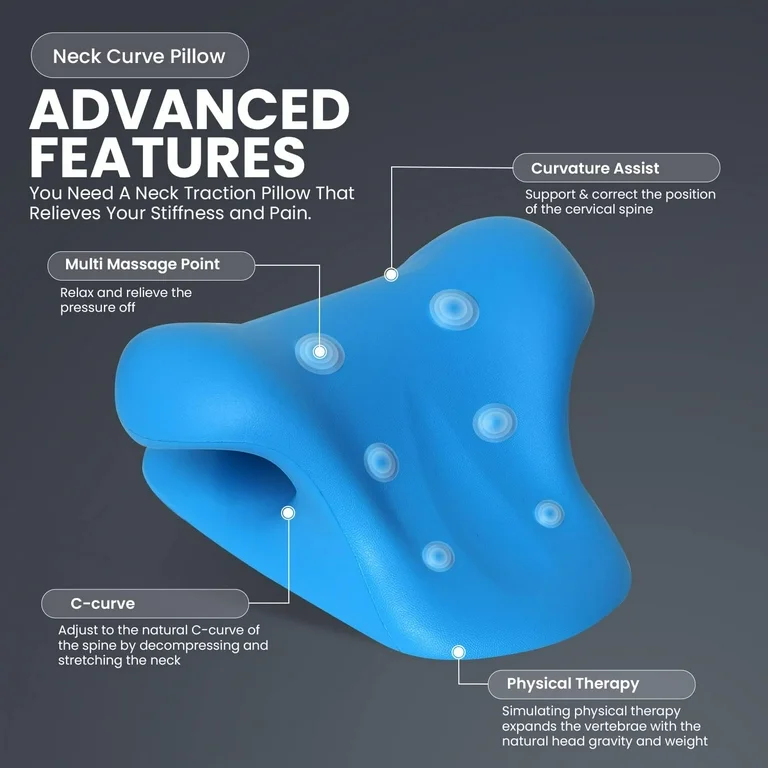Improve Your Posture and Reduce Neck Pain with the Neck Cloud
Improve Your Posture and Reduce Neck Pain with the Neck Cloud
Blog Article
The Effect of Tension on Neck Pain: Approaches for Decreasing Stress and Discomfort
In today's busy world, it's no key that anxiety has come to be a prevalent aspect in the onset and worsening of neck pain. The intricate connection between stress and muscle mass stress often leaves people looking for relief from the pain that follows. By discovering targeted techniques targeted at decreasing stress and promoting leisure, one can start to resolve the source of neck discomfort and work towards an extra balanced state of health. Join us on a journey to untangle the impact of stress and anxiety on neck pain and discover effective means to minimize pain and enhance overall lifestyle.
Understanding Stress-Related Neck Pain
Stress-related neck pain can manifest as stress, rigidity, or pain in the neck and shoulder area. The connection between anxiety and neck discomfort lies in the body's physiological reaction to tension, which can result in muscular tissue stress and tightness in the neck muscular tissues.

Identifying Common Stress Locations
Frequently experienced by individuals under stress, tension locations in the body can offer useful understandings right into the physical indications of psychological strain. One usual tension area is the neck, where anxiety often materializes literally. Tension migraines, stiff neck muscles, and restricted variety of motion are typical symptoms of stress-related neck stress. The shoulders are another usual location where stress builds up. Stress can create the muscle mass in the shoulders to tighten up, leading to pain and pain. Furthermore, the upper back is susceptible to tension accumulation, especially in people who experience chronic anxiety. Poor position and prolonged resting can worsen tension in this area. The jaw is likewise an usual place for stress-related tension, as many individuals clinch their jaw or grind their teeth when stressed. Recognizing these common stress areas can aid people acknowledge the physical signs of stress and take actions to resolve them before they intensify into chronic pain or discomfort.
Applying Leisure Techniques
To efficiently take care of stress-related stress in the body, applying leisure methods is critical. Relaxation methods are beneficial devices for lowering neck discomfort triggered by tension. Deep breathing workouts can help relax the mind and kick back strained muscle mass in the neck and shoulders (neck cloud). Practicing mindfulness meditation can additionally be advantageous in easing stress and promoting leisure. Modern muscle relaxation, where you systematically tense and after that relax various muscular tissue teams, can release built-up tension in the neck area. Additionally, activities like yoga exercise and tai chi include both physical motion and leisure, making them efficient helpful resources methods for reducing stress and anxiety and neck pain. Taking routine breaks throughout the day to stretch and unwind can avoid muscular tissue rigidity and tension from building up. By integrating these leisure methods into your daily routine, you can help manage anxiety levels, lower tension in the neck, and reduce discomfort related to stress-induced neck pain.
Integrating Self-Care Practices
Incorporating self-care practices is essential for keeping overall health and managing stress-related neck pain successfully. Taking part in normal physical task, such as mild extending workouts or yoga exercise, can aid alleviate tension in the neck and shoulders. Practicing good stance throughout the day and taking regular breaks from prolonged resting or screen time can additionally protect against stress on the neck muscles.
Furthermore, prioritizing sufficient sleep and developing a constant sleep regimen can add considerably to lowering stress levels and promoting leisure. Producing a calming going to bed regimen, such as reading a book or taking a cozy bathroom, can help prepare the mind and body for restful sleep. In addition, keeping a well balanced diet rich in nutrients and staying moistened can sustain overall health and reduce inflammation that may aggravate neck discomfort.
Including mindfulness read what he said techniques, such as deep breathing workouts or meditation, can aid take care of tension and advertise leisure. Taking time for oneself, taking part in pastimes, and setting borders to secure personal time are additionally vital facets of self-care that can contribute to reducing stress and anxiety and relieving neck pain.
Looking For Expert Aid
How can people effectively attend to persistent neck discomfort that is affecting their life and wellness? Looking for professional assistance can be an important action in managing and easing neck pain. Consulting with health care professionals such as chiropractic practitioners, physical therapists, or orthopedic experts can give valuable insights and tailored treatment plans. These specialists can conduct detailed assessments to identify the underlying sources of neck discomfort and recommend suitable treatments.
Chiropractic doctors concentrate on spinal manipulation methods to enhance positioning and minimize stress in the neck location. Physical specialists supply targeted stretches and workouts to reinforce muscular tissues, boost flexibility, and enhance total neck feature. Orthopedic professionals can provide advanced clinical treatments such as shots or medical alternatives for serious situations of neck discomfort.
Conclusion

Stress-related neck discomfort can materialize as stress, tightness, or discomfort in the neck and shoulder area. The connection between tension and neck pain lies in the body's physiological reaction to stress, which can result in muscular tissue stress and rigidity in the neck muscular tissues. Stress frustrations, tight neck muscular tissues, and limited variety of movement are typical symptoms of stress-related neck tension. By incorporating these leisure strategies right into your everyday routine, you can help take care of stress and anxiety degrees, minimize tension in the neck, and minimize discomfort associated with stress-induced neck discomfort.

Report this page